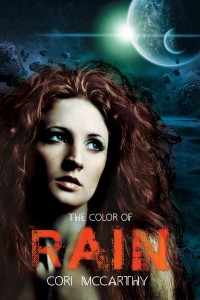 Lyn Miller-Lachmann already reviewed The Color of Rain by Cori McCarthy, which you can read here. I conducted a follow-up interview with Cory via email. Thanks for joining us again!
Lyn Miller-Lachmann already reviewed The Color of Rain by Cori McCarthy, which you can read here. I conducted a follow-up interview with Cory via email. Thanks for joining us again!
JLP: Where in the world did you get an idea to write a story about interplanetary trafficking, set in a future world where Earth as we know it doesn’t exist?
Cori McCarthy: I’m a big believer in the idea that every story has two essential ideas—the flint and steel to make the fire. I wanted to write about a girl who goes too far for someone she loves—who trades her own body—who gets in over her head and then must drown a little to get through it. My second idea was a space setting. The darkness of traveling through unrelenting black with all that might exist where there are no rules or guardians. When these ideas rubbed together, I felt the sparks, but it wasn’t until my agent started asking about a thriller angle to the story that I dived into the terrible truth of human trafficking.
JLP: How does your book comment upon (or reveal) the problems with trafficking on planet earth in the year 2013?
Cori McCarthy:I never set out to talk about human trafficking, but since the book has come out, many people have used it to discuss a very real issue, and I couldn’t be more proud that this is happening. For example, a book reviewer, Charlee Vale, wrote a fantastic and informative post on the nonfiction of human trafficking inspired after her reading of RAIN. http://www.charleevale.com/blog/2013/6/20/the-color-of-rain-and-sex-trafficking.html
I wish I knew where to start when it comes to the truth of human trafficking—especially in America. I suppose I’m initially pleased that people are talking about it. I’m frightened by the idea that many teens aren’t aware that this is a reality in suburban and rural America…that this is much closer than outer space…and much more real than Law and Order: SVU. I hope that getting teenagers to pay attention to these social issues will lead to an adulthood full of caring, action, and hopeful change
JLP: This was a very brave book. Your main character prostitutes herself, partly by choice though partly not. She is ambivalent, attracted towards the very man that victimizes her. She loves another man, yet remains in a sexual relationship with the man that keeps her in bondage. How did you find the courage to write this book and then to present it as a young adult book?
Cori McCarthy:From the beginning, I set out to show the nuances of abusive teen relationships through Rain’s story. From the outside, it’s very easy to label a teen couple as Bad Guy and Victimized Girl (or the inverse), but the truth is that there is often much attraction beneath the abuse. And more often than not, a great deal of love and need. Johnny and Rain do not have a healthy or standard relationship, but she needs things from him that he is willing to provide. And vice versa. They begin to grow together out of necessity, even though Rain knows that Johnny is black-hearted. What’s more, Rain comes to think that she deserves Johnny, not Ben—not the good, loving feelings that she has for Ben. This was particularly hard to show, but it is a very real truth in being entangled in abusive affection.
JLP: I also was impressed with your ability not to present this world in black and white. There was plenty of grey in it. Your heroine isn’t just a “victim.” She has power and she wields it within the space that is given to her. Plus, her relative power is contrasted to the very real powerlessness of many of the other women and “Touched” being trafficked on the space ship, who have no power by comparison. By showing this reality (and it is real, that’s the way it usually works in the real world), you risk having readers think that her victimization is less real. What is your response to people who might respond to her that way?
Cori McCarthy:Rain is not a victim in my perception. The Touched are the victims. Rain chooses the life that she lives, and though it is a terrible choice, I always wanted her to have it. I’m often asked if I ever thought about forcing Rain into her situation, i.e. “What if Johnny abducts her instead of asking for her willingness?” In my mind, forcing Rain—making her a true victim—would mean that she was being raped. And that would be a very different story. What Rain does is not entirely in her control, but it has always been important to me that Rain chooses her life. The heart of this story, for me, is that by the end Rain has to acknowledge the fact—learn from the terrible truth—that desperate actions have dire consequences. No matter the reason for those choices.
JLP: What do you hope teenagers who read your book take away from it?
Cori McCarthy:I always knew that this would be a tough sell for young adult—and possibly banned in certain circles. A few people have asked why it isn’t listed as New Adult (college-aged), and I can only insist that this is a story about going too far for someone you love…and that is something that teenagers do over and over and over again. I wanted to write a story about making it through enormous regret. About self-forgiveness after having given yourself to someone else. And then, hopefully, about taking yourself back.
1 comment for “Human Trafficking, Immigration, and Sexual Violence: an interview with Cori McCarthy”